Cuando encuentras un plugin que parece perfecto para tus necesidades pero no está marcado como compatible con tu versión de WordPress, es natural sentirse inseguro. Podrías preocuparte por posibles conflictos o incluso por dañar tu sitio web.
Nuestros lectores a menudo nos preguntan si es seguro usar plugins de WordPress que no han sido probados con su versión actual. La experiencia nos ha enseñado que la respuesta segura es: 'Depende'. Sin embargo, la situación no siempre es tan arriesgada como parece.
Verás, WordPress actualiza regularmente su software principal para mejorar la seguridad, agregar funciones y corregir errores. Los desarrolladores de plugins intentan mantenerse al día con estos cambios, pero a veces hay un retraso en la prueba y actualización de sus plugins.
En este artículo, discutiremos si puedes instalar de forma segura plugins que no han sido probados con la versión actual de WordPress. Nuestro consejo se basa en años de experiencia probando plugins, administrando sitios de WordPress y ayudando a usuarios reales.
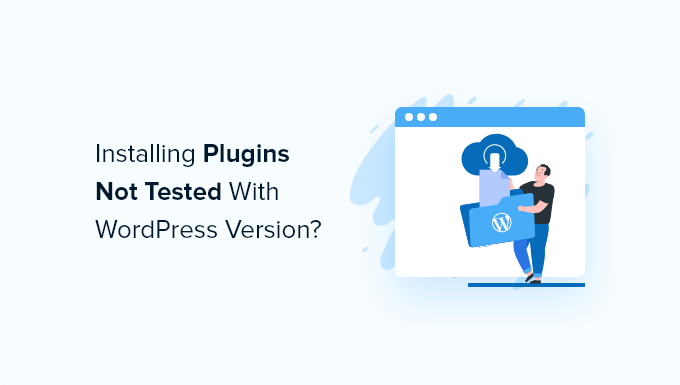
¿Cómo obtiene WordPress la información de 'Plugin no probado'?
¿Te preguntas cómo sabe WordPress si un plugin ha sido probado con tu versión de WordPress o quién es responsable de probarlo?
Al enviar plugins al directorio de plugins de WordPress, los autores deben incluir un archivo 'readme' junto con su plugin. Este archivo es utilizado por WordPress para crear la página que tiene detalles sobre el plugin.
Los autores de plugins son responsables de probar su plugin con la última versión de WordPress y de actualizar manualmente el número de versión en su archivo readme.
Si ves el mensaje ‘Este plugin no ha sido probado con la última versión de WordPress’, significa que el autor del plugin no ha actualizado el archivo readme con el número de la última versión de WordPress.
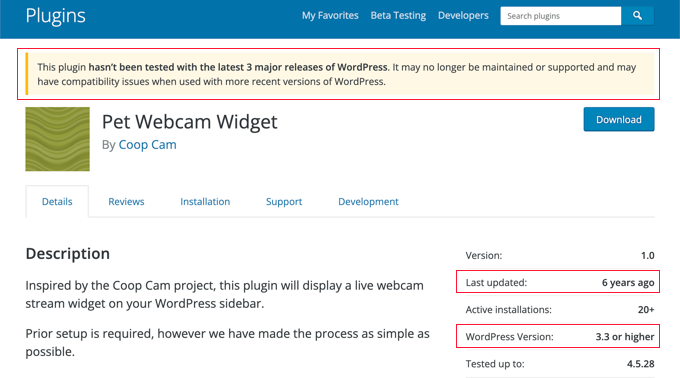
Esto no significa necesariamente que el plugin cause errores de WordPress.
¿Por qué los autores de plugins de WordPress no actualizan los archivos readme?
A veces, los autores de plugins no actualizan sus archivos readme, incluso cuando prueban que su plugin funciona con cada nueva versión de WordPress.
En un mundo ideal, esta información se actualizaría cada vez que un plugin se prueba para ser compatible con la última actualización de WordPress.
Sin embargo, muchos desarrolladores suelen estar ocupados con proyectos de desarrollo remunerados. Dado que los plugins listados en el repositorio de plugins de WordPress son gratuitos, hay menos incentivos para que los desarrolladores mantengan constantemente actualizados los plugins y el archivo readme.
¿Debes instalar plugins de WordPress que no han sido probados?
La respuesta corta es: depende del plugin.
El hecho de que el autor de un plugin no haya actualizado su archivo readme no significa que el plugin no haya sido probado y no funcione con la última versión de WordPress.
Principalmente, depende de la funcionalidad del plugin y de su complejidad. Por ejemplo, hay plugins sencillos que se conectan directamente al núcleo de WordPress y no necesitan actualizarse durante años para funcionar correctamente.
El mensaje de ‘no probado’ no indica que el plugin tenga problemas o problemas de seguridad. Simplemente indica que el desarrollador no ha probado recientemente el plugin o no ha actualizado el archivo readme.
Aquí en WPBeginner, sugerimos instalar plugins que no han sido probados con la versión reciente de WordPress en ciertas circunstancias. Probamos exhaustivamente el plugin para asegurarnos de que funcione como se supone que debe hacerlo.
Si estás leyendo uno de nuestros tutoriales de WordPress que se ha publicado recientemente, esto significa que el plugin era compatible con la última versión de WordPress cuando lo probamos.
Otra forma de verificar si debes instalar el plugin es yendo a la página de desarrollo del plugin. Esto te muestra qué tan activo es el desarrollador del plugin.
Simplemente ve a la página de plugins de WordPress y haz clic en la pestaña 'Desarrollo'.
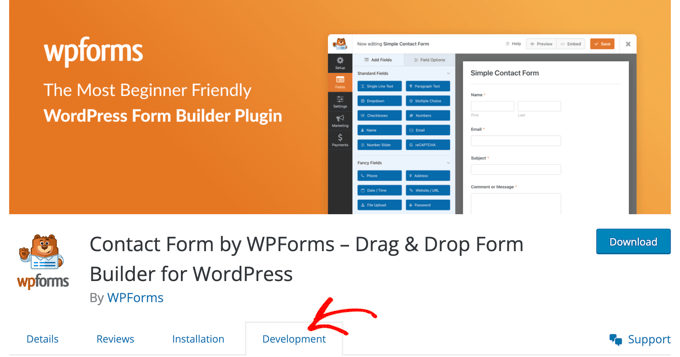
Aquí, puedes ver cuándo se actualizó por última vez el plugin y los cambios y mejoras recientes al plugin en la sección 'Registro de cambios'.
Si el desarrollador está actualizando activamente el plugin, entonces usualmente significa que el plugin es de alta calidad y seguro de usar en tu sitio web de WordPress.
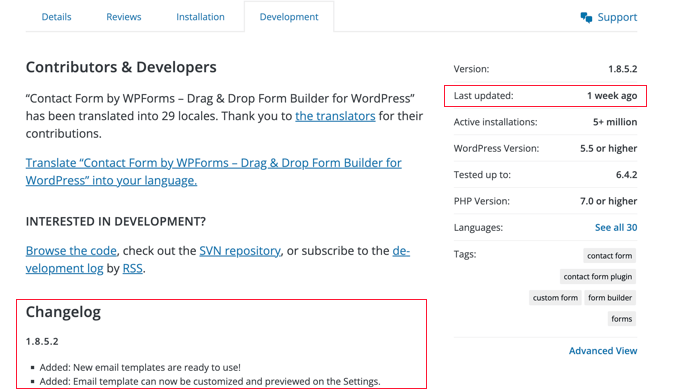
Por otro lado, si un plugin no ha sido actualizado en más de dos años, entonces esto a menudo significa que ha sido abandonado. En ese caso, no deberías instalar el plugin ya que el desarrollador no lo está manteniendo activamente.
También puedes hacer clic en la pestaña 'Reseñas' para ver otras opiniones y cualquier queja sobre incompatibilidad.
Si las reseñas son recientes y de cinco estrellas, entonces es seguro asumir que puedes usar el plugin en tu sitio web.
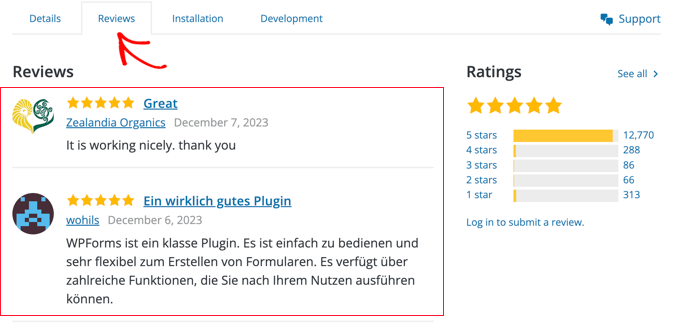
Finalmente, puedes probar el plugin en una instalación local de WordPress. Esto te permite ver si hay algún problema o conflicto sin afectar tu sitio principal.
Guías expertas sobre seguridad de WordPress
Esperamos que este artículo te haya ayudado a saber si debes instalar plugins que no han sido probados con tu versión de WordPress. También podrías querer ver otros artículos relacionados con mantener seguro tu sitio web de WordPress:
- ¿Es seguro usar plugins de WordPress obsoletos? (Explicado)
- ¿Debo dar permiso a los plugins de WordPress para recopilar datos?
- Razones por las que debes evitar temas y plugins de WordPress 'nulled' (piratas)
- ¿Debes dar acceso de administrador a los desarrolladores de plugins para corregir errores?
- Cómo desinstalar correctamente un plugin de WordPress (Guía para principiantes)
- Cómo mover WordPress de HTTP a HTTPS correctamente (guía para principiantes)
- Cómo escanear tu sitio de WordPress en busca de código potencialmente malicioso
- Los mejores plugins de seguridad para WordPress para proteger tu sitio (Comparado)
- Cómo realizar una auditoría de seguridad de WordPress (Lista de verificación completa)
- La guía definitiva de seguridad de WordPress (paso a paso)
Si te gustó este artículo, suscríbete a nuestro canal de YouTube para obtener tutoriales en video de WordPress. También puedes encontrarnos en Twitter y Facebook.





Mrteesurez
¡Gracias por la perspectiva! Solía evitar los complementos que no habían sido probados con la última versión de WordPress, temiendo que pudieran causar problemas. Sin embargo, me di cuenta de que centrarse en la funcionalidad y las reseñas del complemento es más importante. He instalado con éxito varios complementos que estaban marcados como “no probados con tu versión actual” y descubrí que funcionaban perfectamente. Encontré que siempre y cuando el complemento cumpla su propósito y tenga comentarios positivos, vale la pena intentarlo. Este enfoque me ha permitido explorar una gama más amplia de complementos para mi sitio, mejorando su rendimiento general y la experiencia del usuario, además de agregar más funciones.
Moinuddin Waheed
La mayor parte del tiempo, muchos de nosotros no instalamos un plugin solo porque no ha sido probado para las actualizaciones recientes de WordPress.
Gracias por la aclaración de que no importa si no ha sido probado y por qué no importa si ha sido probado o no.
La funcionalidad del plugin es lo que decide su usabilidad y si debe o no instalarse, ya que el equipo de revisión de WordPress ya habría aprobado la lista de verificación.
Soporte de WPBeginner
Glad we could help understand what to expect with the message
Administrador
Jiří Vaněk
Gracias por la explicación. Siempre reviso estos datos antes de instalar complementos y nunca se me ocurrió que funcionara así y que los datos simplemente no estuvieran actualizados. Entonces, ¿asumo que buscas información directamente en el sitio web del desarrollador?
Soporte de WPBeginner
No siempre el sitio del desarrollador, también puedes consultar el foro de soporte del complemento para ver si responden preguntas de soporte.
Administrador
Jiří Vaněk
Gracias, lo tendré en cuenta la próxima vez. He abandonado muchos complementos así por miedo a que ni siquiera al autor le importe. Esta es una gran noticia para mí.
Moinuddin Waheed
Gracias por aclarar las dudas relacionadas con la actualización e instalación del plugin.
Siempre he dado un paso atrás al decidir instalar un plugin para cierta funcionalidad, ya que siempre me da miedo de las vulnerabilidades de seguridad si el plugin no se actualiza recientemente, especialmente con las actualizaciones de WordPress.
¿Existe algún mecanismo utilizado por el repositorio de plugins de WordPress antes de permitir que alguien envíe plugins disponibles para descargar para garantizar la compatibilidad y la seguridad?
¿o cualquiera puede simplemente agregar un plugin al repositorio de plugins de WordPress disponible para descargar?
Soporte de WPBeginner
Existe un proceso de revisión para cualquier plugin enviado al repositorio de plugins de WordPress.org que revisaría un plugin antes de que se agregue.
Administrador
Jiří Vaněk
Entonces, ¿asumo que alguna prueba de vulnerabilidad simple del código también es parte de este proceso, o esa es únicamente responsabilidad del desarrollador del plugin?
Soporte de WPBeginner
El proceso de revisión verifica la seguridad, la documentación y la presentación de los plugins que se agregan al repositorio de plugins de WordPress. El desarrollador del plugin debería ser quien administre la seguridad del plugin, pero la segunda verificación la realiza el equipo de revisión de plugins de WordPress.org para estar seguros.
Jiří Vaněk
Vaya, gracias equipo de wpbeginner, por la aclaración. No sabía esto. Es genial saber que no todo entra en WordPress. Genial
Andrew
Wordpress eliminó la sección de compatibilidad, así que ahora es imposible votar. La advertencia no significa nada, por favor confírmalo y actualiza.
Soporte de WPBeginner
Thank you for letting us know, we will certainly look into updating our article
Administrador
sazi
gracias
Prashant Ranjan
Antes que nada, gracias por este gran artículo que abre los ojos y aclara todas las dudas relacionadas con la instalación de plugins no probados. Siempre he dudado en instalar plugins no probados a pesar de sus excelentes reseñas, solo porque no ha sido probado para un tema en particular. Por ejemplo, me abstuve de instalar el plugin oficial de Google Adsense con mi tema actual para mi sitio web de viajes por la misma razón. Colocar anuncios manualmente en cada publicación es tedioso, así que lo intentaré ahora. Pero cómo Google no ha actualizado su archivo readme para el plugin de Adsense, está fuera de mi comprensión.
Nouman Younas
Estaba buscando este tema.
Recientemente revisé mis plugins y la mitad de ellos no se han actualizado en meses y algunos no se han actualizado en 2-3+ años.
No sé qué hacer... preferí deshabilitar esos plugins que no son obligatorios.
Soporte de WPBeginner
Como se menciona en el artículo anterior, a veces el autor del plugin no siente la necesidad de actualizarlo si nada está roto. Si un plugin funciona bien en tu sitio y no ha sido actualizado en menos de 2 años, entonces puedes usarlo. Si tiene más de 2 años, deberías dejar de usarlo y buscar un plugin alternativo.
Administrador
Nouman Younas
thank you for answer
Sí. Finalmente decidí eliminar esos plugins viejos. Algunos no tienen alternativa como "currencyr".
Supongo que optar por un plugin premium es una buena opción o algo más.
Soporte de WPBeginner
Me alegra que te haya resultado útil. ¿Has visto WP Currency Converter?
Kitty
¡Gracias por este consejo! Hasta ahora, en mi experiencia mínima con WP, he evitado los plugins que no eran compatibles con la versión más actual de mi tema porque no tendría idea de cómo arreglar algo si el plugin afectaba negativamente lo que había configurado previamente. Tener la regla general de los 2 años me ayudó a decidir usar un plugin que no se ha actualizado en 1 año... hasta ahora todo bien (el plugin es TinyMCE Spellcheck).
Doug
Gran detalle y consejo. He estado dándole vueltas a esto en mi cabeza por tanto tiempo que no te imaginas cuánto aprecio los detalles.
Keith Davis
Buen consejo y gracias por la información adicional sobre los plugins que no se han actualizado en dos años.
Tiene perfecto sentido.
Peter Cralen
Why somebody will install plugin if developer is even not able to update one number in readme file?
It is like purchase service from hosting company where their home page is down
Personal de WPBeginner
Ese es el punto, no lo compraste. Está disponible gratis sin garantía y con soporte muy limitado.
Peter Cralen
Creo que el precio no es valor, no importa si es gratis o de pago.
Sería mejor si la gente se enfocara en la calidad en lugar de tomar algo gratis, porque es gratis nada más.
Joel James
Estoy de acuerdo contigo. ¿Por qué no puedes probarlo tú mismo, cuando es gratis y lo necesitas? Los desarrolladores pueden no tener tiempo para actualizar el texto de readme en cada actualización de WordPress. No tiene sentido quejarse de ello, ¡ya que están dando su trabajo gratis!
Angélica Costa
Porque ese plugin a veces es el único que te funciona. Y solo porque no se ha actualizado, no significa de ninguna manera que no funcione.
Y eso se debe en parte a la increíble retrocompatibilidad de WordPress.
Ryan Hellyer
Algunas personas se niegan a actualizar el readme porque al hacerlo también necesitas aumentar el número de versión, lo que a su vez desencadena una versión y hace que los usuarios necesiten actualizar.
Puedes modificar el readme sin aumentar tu número de versión y, por lo tanto, desencadenar una actualización, pero entonces tienes múltiples copias del mismo plugin con el mismo número de versión que no son idénticas. Además de sentirse mal, eso podría teóricamente engañar a un sistema de seguridad que realiza un hash del sistema de archivos y lo compara con un conjunto conocido de plugins descargados previamente.